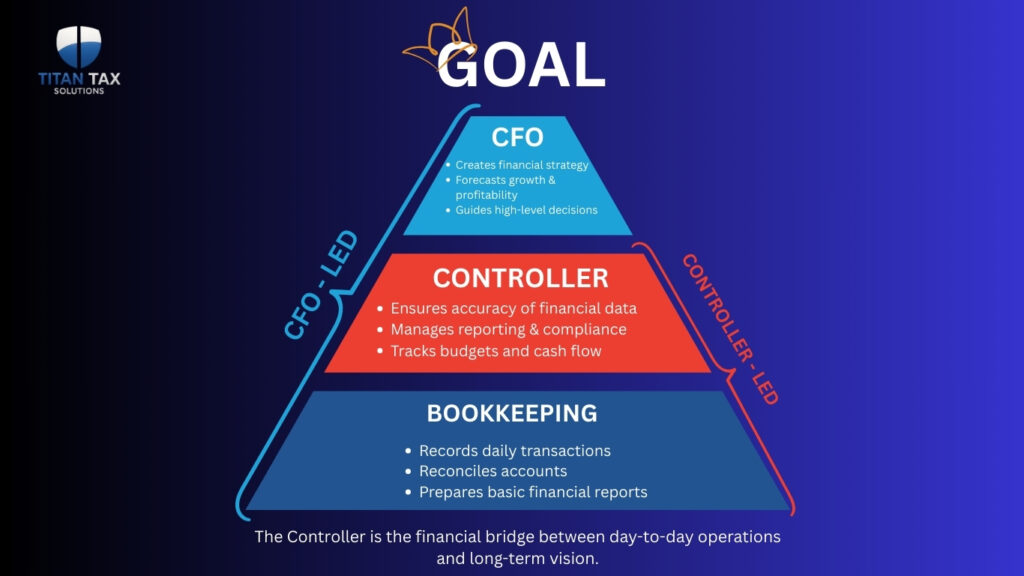At first glance, managing business finances may seem straightforward: track your income, record expenses, file taxes. But as your business grows, so does the complexity of your financial picture and that’s when relying on a bookkeeper alone just isn’t enough.
There are three distinct roles that support your financial ecosystem: the Bookkeeper, the Controller, and the Chief Financial Officer (CFO). Each plays a unique part in helping your business not only stay compliant, but scale strategically and sustainably.
In this post, we’ll break down the key responsibilities of each role and show how they work together to drive growth and profitability.
Bookkeeper: The Foundation
Every great business starts with clean, accurate books. And behind those numbers? A bookkeeper quietly keeping everything in order.
Your bookkeeper is the foundation of your financial system, the one who ensures that every transaction, no matter how small, is recorded correctly. They don’t just keep your records neat; they keep your business out of hot water with the IRS, help you avoid cash flow surprises, and make sure you’re not flying blind when tax season hits.
Think of them as your financial historian, documenting everything that’s happened in your business so you can make informed decisions moving forward.

Here’s what a skilled bookkeeper brings to the table:
✔️ Recording daily income and expenses
✔️ Reconciling bank accounts and credit cards
✔️ Managing invoices, receipts, and bill payments
✔️ Preparing basic financial reports like your Profit & Loss and Balance Sheet
✔️ Keeping your books organized and tax-ready year-round
Just starting out? A reliable bookkeeper may be all you need to stay organized and compliant.
But once your business starts growing, adding employees, taking on bigger expenses, or planning for expansion bookkeeping alone won’t be enough.
That’s when you need the next layer: a controller to ensure oversight, and eventually a CFO to guide your financial strategy.
The bottom line?
Bookkeeping is the beginning of smart financial management. But it shouldn’t be the end.
Controller: The Financial Bridge
Why does your business need a controller especially when growth gets messy?
As your business grows, so does the complexity of your finances.
You might still have a bookkeeper handling daily transactions but now you’ve got payroll to track, multiple income streams to reconcile, budgets to manage, and stakeholders to answer to. Suddenly, it’s not just about recording the numbers, instead it’s about making sure they actually mean something.
That’s where a Controller comes in.
Think of the Controller as the bridge between your bookkeeper and your CFO or between your past activity and your future decisions. They turn raw data into trustworthy financial insight.
While your bookkeeper ensures everything is entered, your Controller ensures it’s accurate, timely, compliant, and useful.
What Does a Controller Do?
A strong Controller brings structure, accountability, and precision to your financial operations. They’re not just keeping you organized, they’re keeping you protected and prepared for what’s next.
Here’s what they handle:
✔️ Reviewing financial reports for accuracy and consistency
✔️ Ensuring compliance with tax codes, laws, and accounting standards
✔️ Monitoring and improving internal controls and accounting systems
✔️ Managing your budgeting process and tracking cash flow
✔️ Overseeing month-end and year-end close
✔️ Flagging financial red flags before they become costly mistakes
Protip: If you’re scaling your business, managing multiple team members, or starting to feel overwhelmed by financial oversight, it’s probably time to bring in a Controller.
They’ll give your leadership team the clarity to make smarter decisions, and the confidence to grow without guesswork.
CFO: The Strategic Guide
Why is having a CFO a game changer?
At some point, every ambitious business outgrows “just keeping the books.” You’re no longer just trying to stay afloat, you’re planning for the next location, exploring new service lines, managing bigger teams, and thinking five years ahead. That’s when you need more than a bookkeeper or a controller.
You need a CFO, your business’s strategic financial compass.
Unlike bookkeepers who track transactions or controllers who ensure accuracy, a Chief Financial Officer (CFO) focuses on the big picture: long-term growth, profitability, and sustainability.
They’re not just reacting to your numbers.
They’re helping you shape your financial future.
What Does a CFO Actually Do?
Your CFO plays a high-impact role across leadership, strategy, and execution. Here’s how they drive your business forward:
✔️ Designing long-term financial strategies aligned with your vision
✔️ Forecasting growth and profitability with data-driven precision
✔️ Analyzing key performance indicators (KPIs) and business metrics
✔️ Advising on major decisions like pricing models, expansion plans, and service investments
✔️ Managing capital, funding, investor relations, and risk mitigation
✔️ Guiding executive teams through complex choices with financial clarity
They’re the ones asking questions like:
“Is this investment really worth it?”
“What’s our break-even point on this expansion?”
“Are we positioned for funding or financial risk?”
But I am not Ready for a Full Time CFO!
You don’t need to hire an in-house executive to access this kind of insight.
At Titan Tax Solutions, our fractional CFO services deliver the strategic brainpower and financial leadership of a seasoned CFO without the full-time salary.
Whether you’re navigating cash flow challenges, planning for a major transition, or simply want to take control of your financial direction, we’re here to help you scale smarter.

Why You May Need All Three
Let’s talk about financial teams.
Because just like you wouldn’t build a house without a strong foundation, you shouldn’t build a business without one either.
You may have started with just a bookkeeper and that made sense in the beginning.
But as your business grows, so does the complexity of your finances. More income. More expenses. More decisions. More risk. And more at stake if you miss the numbers.
That’s why you need more than just one financial professional, you need a complete financial support system.
Here’s how the three core roles work together:
🔹 The Bookkeeper – Keeps track of everything that already happened. They log transactions, manage invoices, and keep your records in order. Without them, your foundation is unstable.
🔹 The Controller – Ensures those numbers are accurate, timely, and trustworthy. They bridge the gap between data and decision-making, ensuring your financial reports make sense and your internal systems stay compliant.
🔹 The CFO – Looks forward and asks, “What’s next?” They use that clean, reliable data to forecast, strategize, and guide your business toward growth, profitability, and long-term success.
Think of them as your financial dream team, each playing a vital role in supporting your goals.
These Trio, Together Form Your Financial Ecosystem
When these three roles are aligned, you’re not just surviving, you’re:
- Making faster, smarter business decisions
- Catching problems before they become crises
- Planning proactively instead of reacting under pressure
- Positioning your company for real, sustainable growth
Whether you need all three right now or are just starting to build your financial team, it’s important to understand that these roles don’t compete they complement each other.
For more updates and details visit our Facebook Page!
Ready to Build Your Financial Team?
Whether you’re experiencing cash flow dips, planning to expand, or simply need better financial oversight, Titan Tax Solutions is here to help.
We offer:
- Bookkeeping that keeps your records clean
- Controller services that bring structure and oversight
- Fractional CFO leadership that drives strategy and results
At Titan Tax Solutions, we offer scalable, outsourced financial services to meet you where you are, whether that’s a dependable bookkeeper, structured controller oversight, or forward-thinking CFO leadership.✅ All the clarity.
✅ None of the guesswork.
✅ No full-time salary required.
#CFOservices #ControllerServices #Bookkeeping #CFOaccountingservices #FractionalCFO #TitanTaxSolutions #FinancialStrategy #BusinessFinance #AccountingSupport #GrowWithConfidence


